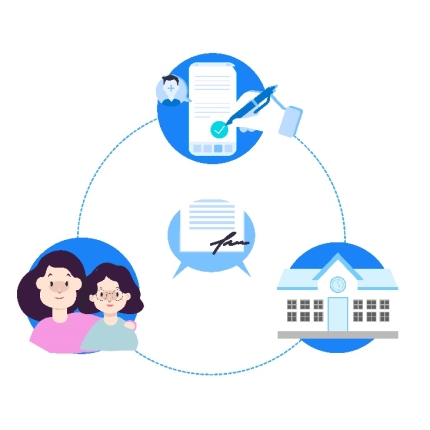

Due to COVID-19, the Korean government has decided on the ‘online new semester’ for the first time in history. From April 9th, the government decided to conduct distance learning for elementary, middle, and high schools in Korea.
Online class platforms will be used for distance learning. The Ministry of Education provides manuals and guidelines to use platforms such as EBS Online Class and Google Classroom based on characteristics and curriculum of schools.
There is one thing that educational institutions need to prepare before using online class tools. It is ‘personal information collection and usage agreement’. Students must enter personal information such as their name and grade, and agree on personal information collection and usage in accordance with the ‘Digital Signature Act’. This is what schools have to do before online classes.
However, it is actually impossible to collect personal information collection and usage agreements one by one when school attendance is delayed. As a result, ‘non face-to-face personal information collection and usage agreement’ has emerged. Especially, blockchain-based signature service is doing great.
“This is due to convenience,” said Choi Chung-yeol, CEO of Glohands. He said, “Schools have to decide how to collect signatures from thousands of students.” “These concerns have made this service a viable alternative to quickly finishing the process,” he added.
Glohands has developed blockchain-based digital signature service. They have mainly provided digital contract-based services to companies and associations. The reason this service was adopted in the online new semester is that a stable and efficient system was needed in the absence of a suitable alternative.
In a confused situation due to the unprecedented online new semester, this service can reduce administrative inconvenience related to ‘personal information collection and usage agreement’. Glohands receives inquiries for cooperation from the office of education.
Personal information collection and usage agreement are sent to students and parents via SMS or KakaoTalk simultaneously. Students only need to write their name and class name, agree to the checklist on the document, and sign it. Schools can check the status of agreement and omission in real time. Since this is blockchain-based service, it is tamper-proof, secure, and efficient.
Chung-Ang University and Buhung High School in Busan recently adopted this service and proceeded with personal information collection and usage agreement. Lee Sae-rom, a teacher in charge of online classes at Buhung High School, said, “It was decided to reduce teacher’s task and make administrative work more efficient.” “The advantage of this service is that is can transfer large amount of data and complete the process quickly,” she added.
Lee Yu-mi(2020.04.02) 혼란의 온라인 개학..’블록체인 기술’ 의외의 쓰임새
retrieved from https://news.mt.co.kr/mtview.php?no=2020040214292442150&type=1






